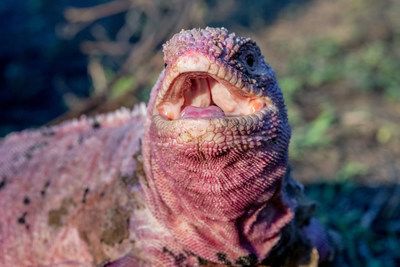Hope for critically endangered pink iguana
Recent findings surrounding nesting sites and predators of this species help target conservation efforts and prevent extinction
Rangers from the Galápagos Conservancy and Galápagos National Park Directorate (GNPD) have embarked on joint expeditions to the remote Wolf Volcano on Isabela Island as part of "Iniciativa Galápagos" to help find and save the pink iguana.1 This remarkable reptile has a current global population estimated at only 211 adults, with no juvenile iguanas having ever been documented.2 This has prompted rising concerns to the species approaching extinction.
The one-of-a-kind pink iguana (Photo courtesy of Galápagos Conservancy).

The initiative undertaken by these 2 entities has revealed and documented the first nesting sites and first ever hatchling and juvenile iguanas. Additionally, hidden trails cameras around the volcano found significant evidence of nesting activities of pink iguanas. Further, camera trap surveys of the nesting area found that non-native feral cats are heavily praying on young pink iguanas as they come out from underground nests. This information can help better protect these creatures and influence the next conservation actions.
"Excellent news for our country! Pink iguana hatchlings and juveniles were discovered for the first time after years of research. This is thanks to a collaboration between the GNPD and the Galápagos Conservancy. Congratulations to everyone who contributed to this discovery!” expressed Gustavo Manrique, Ecuadorian minister of the environment, in the release.1
Currently, Iniciativa Galápagos is prioritizing additional support for research, monitoring, and protection of pink iguana nesting sites. The GNPD, with funding from the Galápagos Conservancy, has created a permanent field station with a 360-degree view of the volcano to help protect against illegal poaching and wildlife trafficking.
Danny Rueda, director of the Galápagos National Park, thanked Galápagos Conservancy for its support and stated, in the release, "This remote base will facilitate conservation and monitoring work on the volcano, helping guarantee the conservation and restoration of the pink iguana population."1
"The discovery of the first ever nest and young pink iguanas together with evidence of the critical threats to their survival has also given us the first hope for saving this enigmatic species from extinction," said Paul Salaman, PhD, president of Galápagos Conservancy.1 "And we're so proud of our partnership with the Galápagos National Park that has yet again resulted in a huge stride forward towards saving the precious and unique biodiversity of Galápagos. Now our work begins to save the pink iguana."
References
- Major discovery gives hope for saving critically endangered pink iguana. News release. Galápagos Conservancy. December 21, 2022. Accessed January 4, 2022. https://www.prnewswire.com/news-releases/major-discovery-gives-hope-for-saving-critically-endangered-pink-iguana-301707582.html
- Expedition reveals pink land iguana is on the verge of extinction. Galápagos Conservancy. August 27, 2021. Accessed January 4, 2022. https://www.galapagos.org/newsroom/expedition-reveals-pink-land-iguana-is-on-the-verge-of-extinction